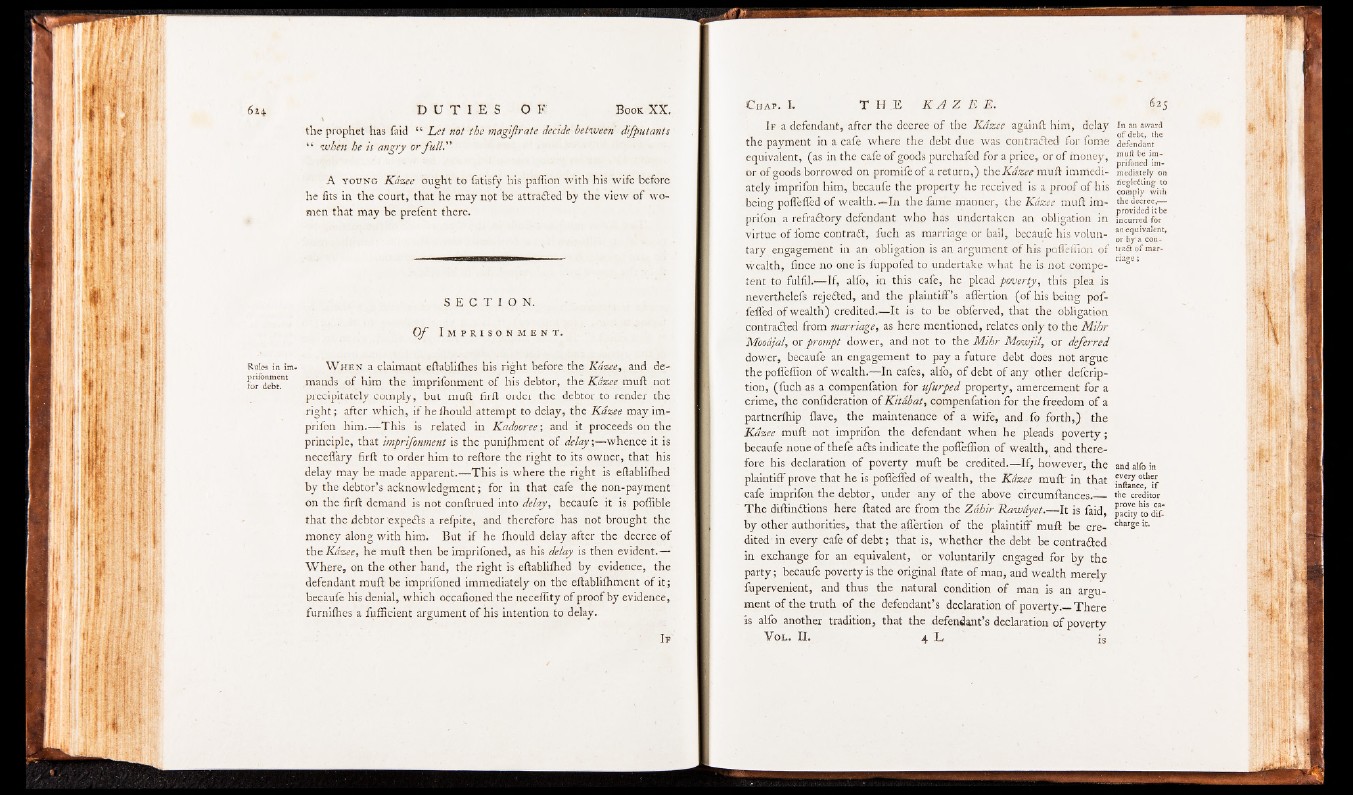
Rules in im-
prifbnment
for debt.
D U T I E S O F B o o k X X .
the prophet has fa id “ Let not the magifirate decide between difputants
“ when he is angry or fu ll? '
A young Kdzee ought to fatisfy his paffion with his wife before
he fits in the court, that he may not be attracted by the view of women
that may be prefent there.
S E C T I O N .
O f I m p r i s o n m e n t .
W h e n a claimant eftablilhes his right before the Kazee, and demands
of him the imprifonment of his debtor, the Kdzee muft not
precipitately comply, but muft firft order the debtor to render the
right; after which, if he Ihould attempt to delay, the Kdzee may imprifon
him.— This is related in Kadooree; and it proceeds on the
principle, that imprifonment is the puni/hment of delay;— whence it is
neceflary firft to order him to reftore the right to its owner, that his
delay may be made apparent.— This is where the right is eftablilhed
by the debtor’s acknowledgment; for in that cafe the non-payment
on the firft demand is not conftrued into delay, becaufe it is poffible
that the debtor'expefts a refpite, and therefore has not brought the
money along with him. But if he Ihould delay after the decree of
the Kdzee, he muft then be imprifoned, as his delay is then evident.—
Where, on the other hand, the right is eftablilhed by evidence, the
defendant muft be imprifoned immediately on the eftablilhment of it;
becaufe his denial, which occafioned the neceffity of proof by evidence,
furnilhes a fufficient argument of his intention to delay.
If
If a defendant, after the decree of the Kdzee againft him, delay
the payment in a cafe where the debt due was contracted for feme
equivalent, (as in the cafe of goods purchafed for a price, or of money,
Or of goods borrowed on promife of a return,) the Kdzee muft immediately
imprifon him, becaufe the property he received is a proof o f his
being poflefled of wealth.—In the fame manner, the Kdzee muft imprifon
a refbaftory defendant who has undertaken an obligation in
virtue of fome contract, fuch as marriage or bail, becaufe his voluntary
engagement in an obligation is an argument of his pofleffion of
wealth, fince no one is fuppofed to undertake what he is not competent
to fulfil.— If, alio, in this cafe, he plead poverty, this plea is
neverthelefs rejected, and the plaintiff’s aflertion (of his being pof-
feffed of wealth) credited.— It is to be obferved, that the obligation
contracted from marriage, as here mentioned, relates only to the Mihr
Moodjal, ox prompt dower, and not to the Mihr Mowjil, or deferred
dower, becaufe an engagement to pay a future debt does not argue
the pofleffion of wealth.—In cafes, alfb, of debt of any other defcrip-
tion, (fuch as a compenfation for ufurped property, amercement for a
crime, the confideration of Kit&bat, compenfation for the freedom of a
partnerlhip Have, the maintenance of a wife, andfo forth,) the
Kdzee muft not imprifon the defendant when he pleads poverty;
becaufe none of thefe a£ts indicate the pofleffion of wealth, and therefore
his declaration of poverty muft be credited.— If, however, the
plaintiff prove that he is poflefled of wealth, the Kdzee muft' in that
cafe imprifon the debtor, under any of the above circumftances.—
The diftindtions here ftated are from the Zdhir Rawdyet.— It is laid
by other authorities, that the aflertion of the plaintiff muft be credited
in every cafe of debt; that is, whether the debt be contracted
in exchange for an equivalent, or voluntarily engaged for by the
party; becaufe poverty is the original ftate of man, and wealth merely
fupervenient, and thus the natural condition of man is an argument
of the truth of the defendant’ s declaration of poverty_There
is alfo another tradition, that the defendant’s declaration of poverty
V ol. II. 4 L is
In an award
o f debt, the
defendant
muft be imprifoned
immediately
on
rfeglefling to
comply with,
the decree,'— ■
provided it be
incurred for
an equivalent,
or by a contrail
o f marriage
;
and alfo in
every other
indance, i f
the creditor
prove his capacity
to discharge
it.